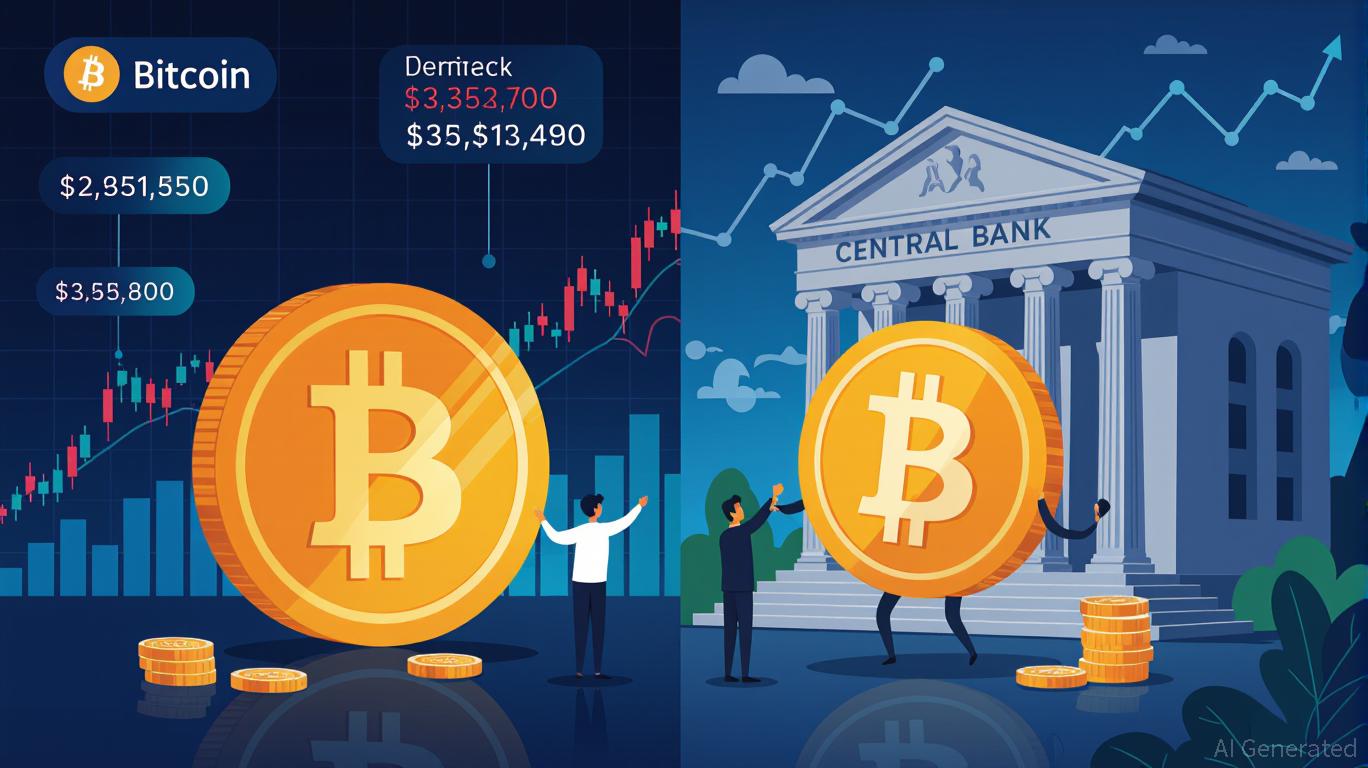AAVE Rises 0.86% as Large Investors Accumulate and Aave Founder Criticizes BoE
- AAVE rose 0.86% in 24 hours to $205.44 amid whale accumulation and regulatory scrutiny, despite 32.98% annual declines. - Major on-chain actors borrowed $180M+ from Aave to purchase 388,615 ETH ($1.32B), leveraging DeFi protocols for ETH accumulation. - Whale strategies maintain 2.1 leverage ratios, while backtests show Aave whale activity correlates weakly with sustained AAVE price gains. - Analysis suggests whale accumulation may signal distribution or liquidity provision rather than bullish price mome
As of November 12, 2025,
Renewed interest in AAVE was fueled by notable whale accumulation and heightened regulatory attention from leading institutions. On November 12, a major on-chain entity borrowed 10 million
Meanwhile, another prominent whale, commonly known as the “66k ETH Borrow Whale,” continued to ramp up its accumulation. Blockchain data shows this whale borrowed an additional $80 million in stablecoins from Aave, transferred the funds to Binance, and exchanged them for 30,549 ETH. This brought the whale’s weekly ETH purchases to 385,706 ETH, worth $1.32 billion. The whale is maintaining a leverage ratio near 2.1, reflecting strong conviction in the long-term outlook for
These whale maneuvers are part of a larger trend where major players utilize Aave’s lending services to finance ETH acquisitions, thereby impacting the broader DeFi landscape. The surge in liquidity and leverage points to a generally optimistic stance among influential market participants.
Backtest Hypothesis
A recent backtest explored how whale accumulation events on Aave relate to subsequent AAVE price movements. The analysis reviewed public news from January 1, 2022, to November 12, 2025, searching for mentions of “Aave whale accumulation” and identified three significant accumulation periods. These periods defined 846 event days, which were then tested using a 30-day holding period and an equal-weight event study approach. Findings indicated that AAVE’s average return after such events did not notably outperform a crypto-market benchmark until day 19, with a distinct negative alpha by day 30. This implies that whale accumulation alone may not reliably predict sustained price gains and could instead point to distribution, market weakness, or liquidity provision.
Disclaimer: The content of this article solely reflects the author's opinion and does not represent the platform in any capacity. This article is not intended to serve as a reference for making investment decisions.
You may also like
Supervised Blockchain Banking Connects Traditional Finance and Digital Assets
- Telcoin becomes first U.S. digital asset bank with Nebraska regulatory approval, launching eUSD - the first bank-issued stablecoin backed by U.S. deposits and treasuries. - JPMorgan's JPMD deposit tokens enable instant 24/7 transactions on Base blockchain, offering yield-generating digital claims on actual bank deposits unlike traditional stablecoins. - Thunes' blockchain infrastructure solutions bridge digital-physical finance gaps, supporting $10B market growth by enabling seamless fiat-digital asset c

Bitcoin News Update: Bipartisan Deal Faces Delays Due to Healthcare Disagreements and Trump Tariff Challenges
- U.S. lawmakers near bipartisan deal to end 40-day government shutdown, funding federal operations through January 30 with ACA tax credit votes and Trump's reversed firings. - House Democrats split over healthcare provisions, while Senate faces hurdles in passing funding package due to healthcare disputes and procedural challenges. - Markets react mixed: crypto surges on shutdown resolution optimism but ETFs see outflows, while semiconductors face volatility amid analyst price target adjustments. - Prolon

MMT Token Experiences Rapid Price Increase: Analyzing Blockchain Governance and Factors Driving Market Sentiment
- MMT Token surged 4,000% during its 2025 TGE before a 70% correction, driven by governance innovation and market sentiment shifts. - Momentum Finance's veMMT model locks tokens for governance rights, while buybacks using protocol fees create deflationary pressure. - Institutional backing ($14.5M IDO) and cross-chain partnerships with Wormhole/LiFi boosted MMT's appeal as a liquidity engine for Sui's ecosystem. - Volatility risks persist due to macroeconomic factors, security concerns, and unproven scalabi

Modern Monetary Theory and the Transformation of Cryptocurrency Valuations: Fresh Momentum or a Risky Gamble?
- MMT-driven fiscal expansion by central banks reshapes crypto valuations, with 55% of hedge funds holding digital assets by 2025. - Algorithmic stablecoins like USDsd expose governance flaws during monetary expansion, while Bitcoin faces inflation-paradox challenges. - CBDCs emerge as government-backed alternatives, prioritizing stability over innovation amid regulatory scrutiny of decentralized models. - MMT's dual impact creates opportunities for institutional adoption but risks centralizing crypto thro
